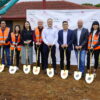As part of the Point Polaris Outlook Series, Point Polaris welcomed their clients and industry professionals to join for a poignant discussion about the state of the residential markets in Melbourne and Sydney. Our guest presenter for the day was Nerida Conisbee, Chief Economist for REA Group and one of Australia’s leading property experts.
Andrew Hogan, Managing Director of Point Polaris, started the lunch by commenting that it was an interesting time in the residential market, with the industry at an inflection point. Speaking to the recent government and regulatory changes affecting the local market, Andrew noted how resilient the industry has been.
The first bellwether of these industry changes occurred mid-last year when banks stopped lending to foreign buyers, which reduced offshore purchasing in Australian residential property.
“Foreign purchasers have proved they can settle apartments without local banks, there are other funds out there stepping in. That was the first issue we faced, but I think the development industry has banded together and stood tall throughout that,” said Hogan
“Most recently, we’ve seen a tax grab by the local state government in changes to the stamp duty concessions for investors. We’re also seeing the RBA and Apra doing everything they can do within their remit.”
Despite these market conditions, Andrew went on to quash the negative press that has continuously labelled the market as ‘oversupplied’. “We look at the number of commencements versus the need for apartments, and if you look at those numbers you’ll see we’re actually in a supply/demand equilibrium,” said Hogan.
“Another factor affecting the market is the vacancy rate, which at a low 1.7 per cent, means our apartments are full. “
“We’re also within an all-time low interest-rate environment, which is propping up construction and expenditure all around.”
By tracking the number of people looking to buy on REA’s platform versus the number of listings, Conisbee was able to track demand in the Melbourne market.
“There are more and more people looking to buy, but less properties selling,” said Conisbee.
“Australians are property obsessed, and it’s because we’ve done remarkably well out of it. We have a lot of confidence in property, and in investing in property.
“As a result, we’re holding on to properties longer to build bigger and bigger portfolios.”
This significant demand for property has affected affordability, driving many first home buyers to consider buying an apartment over house and land. Conisbee pointed to this as a key factor driving apartment demand in Melbourne.
“In Melbourne now, houses are pretty unaffordable for the average first home buyer, but apartments aren’t. The average first home buyer could buy an apartment and not be under housing stress.”
“Affordability does change buyer behaviour significantly,” she said.
These insights point to a market that is challenged by state and federal governments, but is well-placed to withstand changed and continues to show signs of positive growth.








